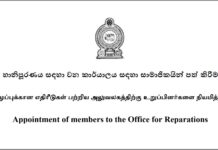- AIESEC Sri Lanka hosts webinar on plastic waste management in view of recycling day
- CEA emphasizes need to adopt a collaborative approach to addressing the issue
- Only 20% of the plastic waste in the market reach recyclers
- Strengthening recycling practices and systems identified as key
In view of Global Recycling Day, youth organization AIESEC Sri Lanka hosted a trilingual online discussion titled ‘A solution to the plastic issue’. The discussion featured an eminent panel of industry experts, including the Director, Solid Waste Management (SWM) of the Central Environmental Authority (CEA), Sarojini Jayasekara; Deputy General Manager at Eco Spindles, Sri Lanka’s largest plastic recycler, Manoj Udawatta; Founder/CEO of ChakraSuthra, Dr. Himesh Fernando; and the General Manager of Modern Pack Lanka, Lahiru Wijerathna.
The panel was moderated by Dhananath Fernando, Chief Operating Officer at Advocata Institute.
Speaking at the panel, the Director of Solid Waste Management at the CEA emphasized the importance of adopting a collaborative approach to addressing the issue. Ms. Jayasekara also highlighted the importance of the industry (brand owners and producers) taking an active role in managing plastic waste.
“The Extended Producer Responsibility (EPR) approach to tackling the issue of waste management is a step in the right direction. The approach is still being conceptualized, but businesses in the industry have come forward in support of it,” she remarked.
EPR is a concept practiced globally where the responsibility of collecting, processing and recycling waste is undertaken by producers (brand owners, packaging suppliers, manufactures and retailers).
It was highlighted that the Western Province alone generates around 7,500 metric tons of solid waste every day, of which only 3,500 metric tons are collected. Of this, only 10% is recycled, 15% becomes compost, and 75% is thrown into open dumps.
“We need to strengthen our existing plastic collection systems. Only 20% of plastic in the market reaches recyclers. We are running under capacity, and this is a pity,” noted the Deputy General Manager of Eco Spindles, Manoj Udawatte.
The urgent need to improve recycling systems at the local government level – to ensure that plastics that are 100% recyclable, like PET (plastic bottles) and HDPE (home care products like shampoo bottles, etc.) reach recyclers – was highlighted.
Representing the packaging industry, the General Manager of Modern Pack Lanka, Lahiru Wijerathna, noted the need for stronger and more practical waste management policies connected to Municipal and Provincial councils.
He highlighted, “Plastic in itself is not the problem. It is man’s mismanagement of it that has made it an issue”. Furthermore, he also noted that implementing systematic recycling of plastic would reduce the expenditure on importing plastics into the country, and minimize the government’s burden to segregate and collect the material.
Raising household level awareness on waste management and incentivizing consumers to dispose of their waste responsibly were also highlighted as immediate priorities. Founder/CEO of ChakraSuthra, Dr. Himesh Fernando, emphasized the importance of propelling behavioral change when raising awareness and education on waste disposal and recycling.
The panel concluded by highlighting the role individuals, businesses and government play, and the collaborative approach that should be taken when addressing issues around plastic waste mismanagement. The importance of reaching circularity in design processes, consumption and recycling was emphasised as key.
Webinar is archived and available on the AIESEC Sri Lanka Facebook Page.












